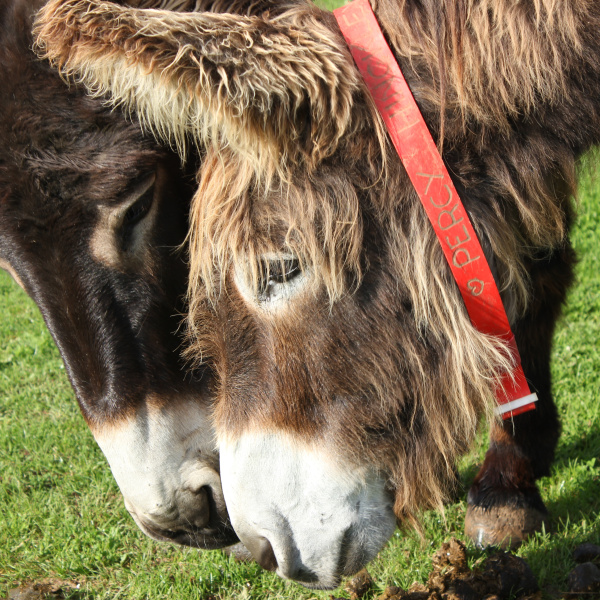Controlling worms in donkeys is fundamental to their health and welfare. Following a suitable worm control programme can keep the number of worms to a minimum.
Donkeys usually acquire worms (internal parasites) by grazing contaminated pasture. While few donkeys will ever be worm-free, the correct and responsible use of wormers alongside good pasture management will help keep the number of worms at a manageable level.
Why is it important to control worms?
Worms live in your donkey’s body, draining their nutrients and sometimes causing damage to the various organs that they can be found in.
Donkeys that are heavily affected by worms can fail to gain or maintain weight and may be in poor condition. However, even without these signs it is important to follow a worm control programme.
Reducing the number of worms is dependant on interrupting the life cycle of the worm to reduce pasture contamination and also using wormers effectively to prevent resistance developing.
What is a faecal worm egg count test?
A faecal worm egg count test (FWEC) records the number and type of worm eggs seen in a sample of your donkey’s dung. A positive result indicates the presence of adult (egg-laying) worms. The count indicates whether your donkey is shedding a low or high number of eggs in its dung.
Not all donkeys grazing the same pasture have the same worm burden. Studies in horses (thought to apply to donkeys too) have found that about 80% of the worm population will be carried by just 20% of the animals. These individuals are known as ‘high-shedders’ and are the most likely to require treatment with a wormer.
FWEC tests are useful but they have their limitations:
- They do not accurately reflect the total number of adult worms
- They only provide a snapshot of the number and type of eggs released at the time of sampling
- They will usually miss pinworm eggs since they are not usually shed in faeces
- They only identify the potential burden of certain types and stages of worm
- You will need to conduct separate tests to check for tapeworm, lungworm and liver fluke, as these cannot be reliably be detected by a FWEC test.
Ideally you should send a sample of your donkey’s dung for FWEC testing four times a year. This will help build a picture of your donkey’s ‘parasite status’ and the type and number of eggs they shed over time. In the UK you can arrange a FWEC test through your vet. Alternatively, you can buy a kit from some equine or agricultural suppliers or they can be bought online. These kits normally contain all the necessary equipment, usually a glove, plastic bag or container, and labels.
You can also send samples for FWEC testing to The Donkey Sanctuary in-house laboratory. Faecal egg counts for donkeys and mules can be carried out by our in-house laboratory and submitted by owners using the forms available on this page. We do not charge for this service but donations are always greatly appreciated. A donation of between £5 and £10 per donkey is suggested to cover costs of running any laboratory tests.
Submit a faecal worm egg count to The Donkey Sanctuary
We conduct egg-counts to help keep your donkeys happy and healthy.
Using a wormer
Wormers come in several different forms: pastes, gels, liquids, tablets and granules. Some can be administered via the given dosing syringe while other products may need to be mixed into a small feed.
Although it seems like there are lots of products to choose from, there are a limited number of ‘active ingredients’ (drugs) which are sold under several different trade names (brands). If your vet suggests a worming treatment is needed they will be able to help advise on the most appropriate product to use. Some equine or agricultural suppliers will have a Registered Animal Medicines Advisor who are also qualified to give advice on worming control programmes and to prescribe some of the wormers.
Before worming you must know your donkey’s weight so that you can give the correct dose. Underdosing (giving too little) will mean there is not enough of the drug to kill all worms that are targeted. Drug-resistant worms will survive and eventually multiply. Over time, as ‘resistance’ develops, this can affect how well a drug works. For this reason, you should round up your donkey’s weight to the nearest 50 kg when giving wormers.
Managing the environment
While the appropriate use of wormers can help to reduce pasture contamination and treat clinical disease, it only has an impact on the parasites within the animal. The vast majority of parasites are found in the environment so control of this population is essential too.
Strategies you can use to control worms in the environment:
- Rotating paddocks to rest the land can help break the lifecycle of some of the worms.
- Poo-picking fields regularly (at least twice a week) will interrupt the worm’s life cycle. It will reduce the number of worm eggs that could hatch and potentially infect your donkey.
- Minimising ‘stocking density’ or the number of animals kept together in the same area.
- Grazing cattle or sheep on your donkeys’ pasture can reduce the number of worm larvae that could potentially infect them.
- Rotating the type of drug used when worming, and keeping a record.
- Avoid spreading donkey dung back on grazing land – donkey manure will need to be composted for a minimum of six weeks with regular turning and maintenance at a minimum temperature of 50 – 70°C in order to kill off worm eggs.
- Harrow pasture only in hot, dry weather. If it is hot and dry eggs will be destroyed, but in mild, damp weather harrowing could increase the chance that your donkey may pick up infective larvae.
